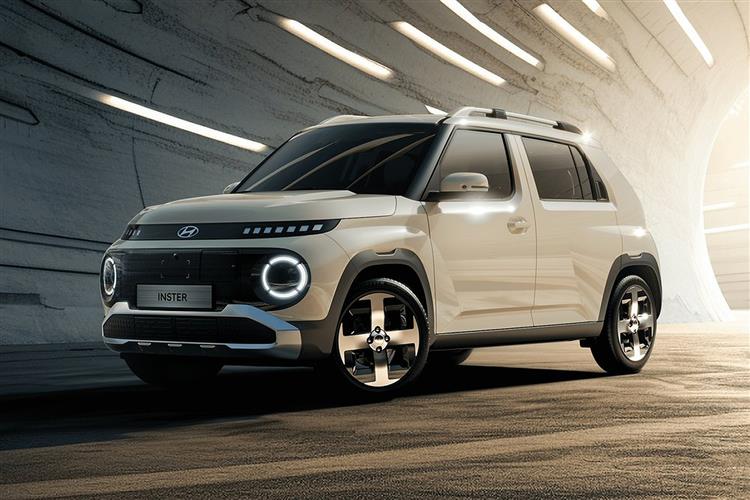INSTER CAN (some text hidden) SECTIONED_new_hyundaiinster_2025
By Jonathan Crouch
Hyundai brings a splash of fun and versatility to the small EV market with this car, the Inster. Jonathan Crouch drives it.
Ten Second Reviewword count: 53
Choosing a really cheap small EV doesn't necessarily mean you have to choose a really boring one. Or so Hyundai thinks anyway. For proof, check out this car, the Inster. It's supposed to be fun. It's certainly practical. And if you're shopping in this segment, it might just be what you're looking for.
Backgroundword count: 174
Hyundai brings a splash of fun and versatility to the small EV market with this car, the Inster. It's aimed at the pricier, trendier end of its segment and, in case you're wondering, the name isn't short for 'Instagram'. Instead, the Korean maker claims it's a mix of the words 'intimate' and 'innovative'. You might think it more logical for the brand to have once more used its familiar IONIQ tag (- perhaps badging this car IONIQ 2?). But apparently that nameplate's reserved for Hyundais with the group's advanced 800V EV platform - and there's nothing like that here. What this car actually should be called is the 'Casper' because a petrol-powered Korean market Hyundai of that name is what the Inster is actually based on, though for this EV variant, an extra 180mm of length has been inserted into the wheelbase. Which as we'll see is significant because the very young and very old customers being targeted here are getting a small EV more internally versatile than any of its rivals. Sounds interesting.
Driving Experienceword count: 269
Helped by its diminutive size, on the move you'll immediately notice that this Hyundai is nippy and agile - though response from the front-mounted motor isn't quite as peppy as you'll find with some rivals. Two versions of it are available, but both perform quite similarly. The Standard Range 42kWh model has 97PS, which allows 62mph to be reached in 11.7s or, if you drive more sensibly, an official EV range of 203 miles to be approached on those occasions where you're in a lethargic mood. The alternative, which most customers will prefer, is the Long Range 49kWh model we're trying here, which gains a supposedly perkier 115PS version of the same motor. This lowers the 62mph time fractionally to 10.6s, though as the torque pulling power figure of 147Nm doesn't change, you won't notice much real-world difference. As for the 'Long Range' bit, well don't get your hopes up too much; the official figure of this pricier variant rises to 229 miles, though as with any EV if your mileage is exclusively city-based, you might well do quite a bit better than that. Assuming of course you keep the car in the most frugal of its provided drive modes - 'Eco'; the others are 'Normal', 'Sport' and 'Snow'. Unlike with quite a few rivals in this segment, there are steering wheel paddles for proper brake regen control, with the fiercest setting almost enough to bring the car to a stop when you come off the throttle. There's an SUV-style Inster Cross variant available at the top of the line-up, but it's no differently engineered from the standard version.
To see the full road test text contact us on 0330 0020 227
Pictures (high res disabled)

.jpg)
|
.jpg)
|
.jpg)
| |||
.jpg)
|
.jpg)
|
.jpg)
| |||
.jpg)
|

|
Statistics (subset of data only)
Min |
Max |
|
Price: |
£23,505.00 (At 17 Sep 2025, 42kWh) |
£28,755.00 (At 17 Sep 2025, Cross) |
Insurance group 1-50: |
21 |
23 |
Max Speed (mph): |
87 (42kWh) |
93 (49kWh) |
0-62 mph (s): |
11.7 (42kWh) |
10.6 (49kWh) |
Electric WLTP-Rated Driving Range (miles): |
203 |
|
Length (mm): |
3825 |
|
Width (mm): |
1610 |
|
Height (mm): |
1575 |
|
Boot Capacity (l): |
238 |
351 |
... and 2 other stats available | ||
Scoring (subset of scores)
Category: Hybrid, Plug-in, Electric & Hydrogen
| Performance | |
| Handling | |
| Comfort | |
| Space | |
| Styling, Build, Value, Equipment, Depreciation, Handling, Insurance and Total scores are available with our full data feed. | |



